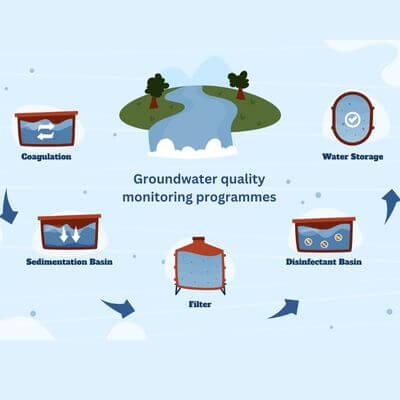

The Groundwater Quality Monitoring Programs by CGWA is the process of measuring the level and quality of groundwater including its annual and seasonal fluctuations. Central Ground Water Authority (CGWA) is the Department of Water Resources, River Development, and Ganga Rejuvenation that performs various regulatory functions for the regulation of groundwater development in India.
A monitoring system is a platform where the level of water and quality records that describe groundwater resources are generated made available and evaluated. CGWA Certificate regulates and controls the development and management of groundwater with jurisdiction in the whole of the country. Below are the factors of Groundwater Quality Monitoring Programs by CGWA:
1. Sampling Network Design
Generally, CGWA establishes well-organized Quality Monitoring Programs that include a sampling network to capture representative data from several types of hydrological zones, land uses, and sources of contamination.
2. Parameter Selection
CGWA identifies and analyzes key water quality parameters that include pH, total dissolved solids (TDS), fluoride, ORP, temperature, conductivity nitrate, arsenic, and other relevant parameters that are based on location characteristics and potential sources of contamination.
3. Frequency of Monitoring
CGWA set up a regular monitoring schedule to track changes in groundwater quality over time. The frequency of monitoring groundwater levels varies based on aspects such as seasonal variations and human activities that negatively impact groundwater.
4. Data Management
Implementing robust data management systems to analyze, store, and interpret groundwater quality data effectively. This involves the use of Geographic Information System (GIS) tools for spatial analysis.
5. Reporting and Communication
CGWA Registration shares the findings of the groundwater quality monitoring programs with the stakeholders, public, and relevant authorities This supports raising awareness and prompting communication participation in groundwater management.
The objective of CGWA Groundwater Monitoring Programs is to promote efficient methods to use groundwater in stressed locations. Here is the list of the main objectives of CGWA, they make their best efforts to follow it:
Groundwater Quality Monitoring Programs by CGWA monitor the major zones of aquifers that include chloride, unions bicarbonate, and sulfate, and the cations sodium, calcium, magnesium, and potassium. Generally, it is a formal process of regularly routinely gather groundwater data, and analyzing it to observe groundwater updates until monitoring objectives are met:
A monitoring network in India is generally designed and implemented to sufficiently track compliance with water quality standards, additionally, it gives enough information to track project implications, and CGWA can give the best benefits to users:
Increasing water pollution, irregualr weather, and increased agricultural use lead to over-extraction of groundwater levels, here we mention some ideas to save groundwater or maintain the groundwater level:





We are the pioneers in offering environmental consulting services to our patrons, giving us the first mover advantage & keeping us ahead of our competitors.
Very experienced in filing, monitoring & submission of CDSCO Compliances, Drugs Manufacturing & sale guidelines, Environmental Impact Assessment, AERB consulting services, Pollution Control Board CTE & CTO Advisory Services, Waste Management Authorization from State Pollution Control Boards, Fertilizers & Insecticides Manufacturing, Wholesale & Import Compliances
